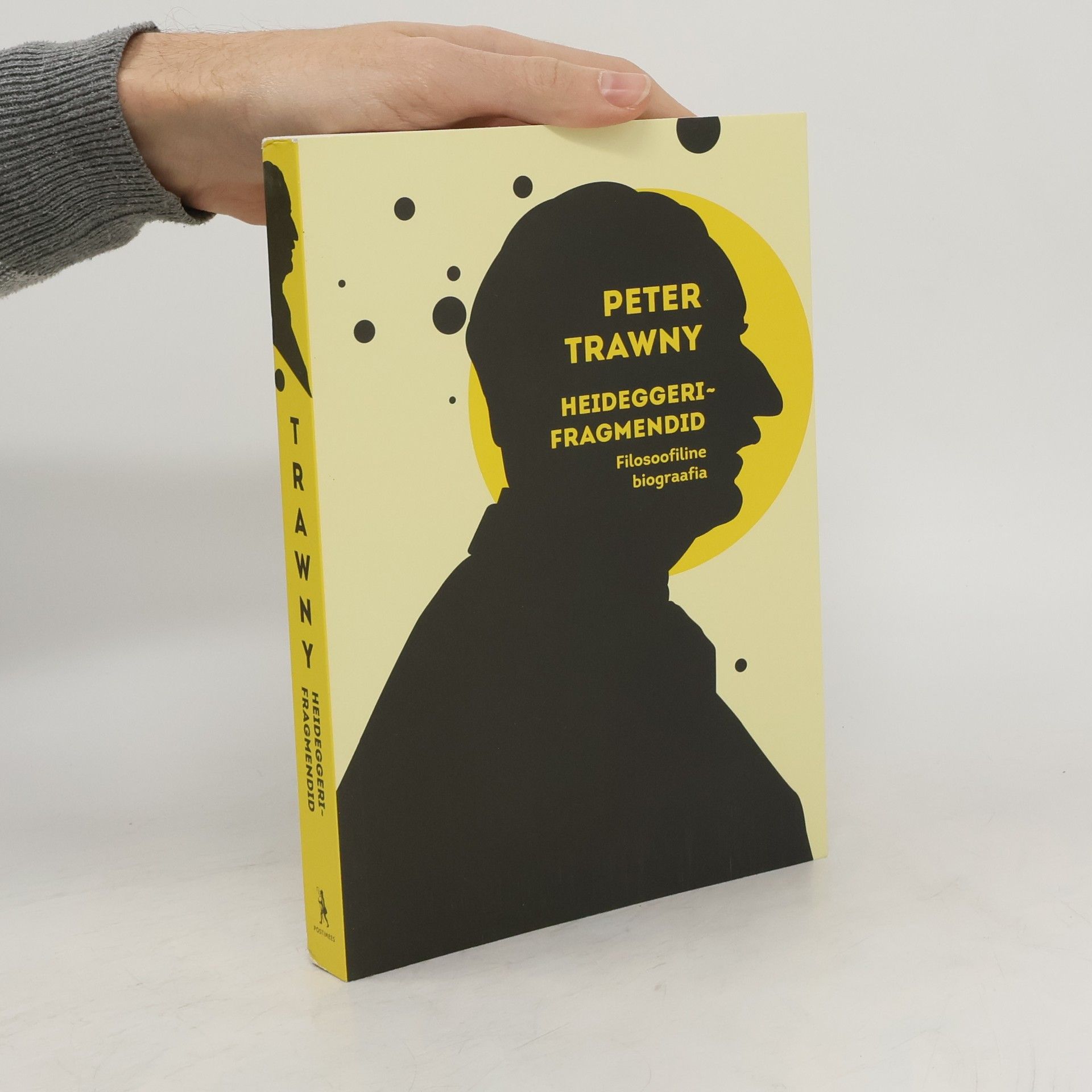Peter Trawny explores Martin Heidegger's controversial Black Notebooks, revealing how they reflect his personal Nazism as integral to his philosophy. This study examines Heidegger's concept of freedom, truth, and ethics, arguing that his decision to publish these notebooks was an expression of his philosophical beliefs, despite their troubling content.
Peter Trawny Libros







Krize pravdy
- 176 páginas
- 7 horas de lectura
Jak vážná je současná krize pravdy? Trawnyho stejnojmenná kniha nepřizvukuje hlasům varujícím před alternativními pravdami, nepanikaří a nemoralizuje, nýbrž věcně analyzuje, jak se to s pravdou má. S oporou hlavních postav filosofické tradice (Sókratés, Kant, Nietzsche, Arendtová) ukazuje, že to s pravdou dnes není o nic horší než v minulosti: pravda byla problémem vždy, lidé se o ni přeli a vždy také měla své svědky a mučedníky. Pravda je v krizi vlastně neustále, protože krize patří k její bytnosti: pravda sama je krizí, a to ve smyslu původního řeckého výrazu — v krizi se tříbí názory a vyjevuje se silnější argument, a s ním i pravda sama. Tím nám autor poskytuje mnohem lepší vodítko pro orientaci v aktuální debatě než soudobá klišé – přijetí pravdy jako krize umožňuje dát pravdě ve veřejném prostoru znovu přiměřený smysl.
Hitler, die Philosophie und der Hass
Anmerkungen zum identitätspolitischen Diskurs
- 172 páginas
- 7 horas de lectura
Zu glauben, der europäische Diskurs könne den Nationalsozialismus wie ein Objekt auf Distanz halten, ist im besten Fall eine naive Hypothese, im schlimmsten Fall aber ein politischer Fehler. Man tut dann so, als hätte der Nationalsozialismus mit dem Rest von Europa, mit den anderen Philosophen, mit anderen politischen und religiösen Sprachen keinen Kontakt gehabt, betont Jacques Derrida in einem Gespräch mit Didier Eribon. Und doch haben Philosophinnen und Philosophen seit dem Zweiten Weltkrieg bis heute die wichtigsten Selbstdarstellungen des Nationalsozialismus ignoriert. Adolf Hitlers »Mein Kampf« gilt noch immer als ein Buch, das einer philosophischen Auseinandersetzung nicht würdig ist. Diese Haltung wirft ein Licht auf die Philosophie selbst. Findet sie in »Mein Kampf« womöglich zu viel von sich selbst? Und was ist es genau, was sie dort findet? Trawnys Lektüre von Hitlers Buch geht der Möglichkeit einer Kontinuität von Philosophie und Nationalsozialismus nicht aus dem Weg. Es ist die Begegnung mit einem Hass, der uns allein schon deshalb bedroht, weil er einmal die Macht ergriffen und das Leben der Gesellschaft beherrscht hat. Es gibt keinen Grund zu meinen, der Hass wäre vergangen.
Liebe ist Sprengstoff, Heil, Unglück, Trost, Ekstase, Fluch, Sicherheit, Gnade, Hass, Wärme, Schönheit, Wahnsinn, Sehnsucht. Vielgestaltig wie sonst nichts, durchdringt sie alle Poren der Welt, überall hinterlässt sie ihre Spuren wie ein ungeschickter Dieb im Dunkel der Nacht. Wer kann sie fassen?Peter Trawny versucht es. Nicht mit einem nüchternen System, sondern in funkelnden Denkbildern. Er befragt die Philosophen, untersucht die Phänomene, spürt der Vielgestaltigkeit nach. Denn Liebe, so zeigt er, kennt viele Formen: Gottesliebe, Nächstenliebe, große Liebe, Weisheitsliebe, romantische Liebe, Hassliebe. Sie ist ein Geschenk, das zum Fluch werden kann, ein Mysterium, das Dasein ermöglicht. Liebe ist Nuance, einzigartig wie Wolken. Dies muss das Philosophieren aufnehmen und sprechen lassen. Literarisch, denkerisch, fragend. Wie dieses Buch.
Im Fokus der Untersuchung steht Martin Heidegger als politischer Esoteriker, der sich bewusst von öffentlichen Diskursen abgrenzt. Peter Trawny beleuchtet, wie das Unzugängliche, symbolisiert durch das »Adyton« im griechischen Tempel, eine zentrale Rolle in Heideggers Denken spielt. Durch die Verbindung von Philosophie und erotischer Erfahrung wird ein intimer Zugang zu Heideggers Werk eröffnet, der die Komplexität und Tiefe seines Philosophierens verdeutlicht.
Aschenplätze
Eine Theorie dieses Subjekts
Das Buch behandelt die Suche nach Selbsterkenntnis und der Frage "Wer bin ich?" anhand autobiografischer Reflexionen. Peter Trawny skizziert sein Leben und beleuchtet Bruchstellen zwischen Handeln und Denken. Es ist eine fesselnde Erzählung über das menschliche und intellektuelle Schicksal in der modernen Welt.
Das Kapital der Musen
Eros und Aura im Widerschein der Kunst
Nach dem Ende der Ursprungs-Mythen der Kunst zeigt das Buch die Herausforderungen der zeitgenössischen Kunst im Markt auf. Es beleuchtet, wie Künstler-Stars durch banale Theorien ihre Erfolge legitimieren. Durch die Analyse verschiedener Kunstformen wird die Lebendigkeit der Kunst und ihr Bezug zur Vergangenheit thematisiert.
Krise der Wahrheit
- 254 páginas
- 9 horas de lectura
Was ist wahr, was falsch? Aus philosophischer Sicht erklärt Peter Trawny die gegenwärtige Krise der Wahrheit. Es tobt eine Riesenschlacht um die Wahrheit: Fake News, Alternative Fakten, Verschwörungstheorien, Lügenpresse, Great Reset, Geschichtsklitterung, postfaktisches Zeitalter – die Situation ist unübersichtlich. Gibt es einen gefährlichen Anschlag auf die Wirklichkeit, eine Krise der Wahrheit? Peter Trawny meint: Nein! Was wir heute erleben, ist nichts anderes als das, was Wahrheit von Anfang an ist: eine Krise. Denn was ist eine Krise? Eine Entscheidung auf Leben oder Tod. Und genau das ist die Wahrheit: eine Macht, die unser Leben in vielen Bereichen bestimmt. Folglich durchdenkt Trawny die Rolle der Wahrheit auf den Feldern Medien, Politik, Öffentlichkeit, Kunst, Geschlecht. Denn es geht nicht ohne Wahrheit: Wir sind Wahrheitswesen durch und durch, unser Leben steht und fällt im Licht und im Schatten der Wahrheit. Mit ihr entscheidet sich, was ich denke und wer ich bin.
Martin Heidegger
Eine kritische Einführung
2nd rev. ed.00In der Philosophie Martin Heideggers manifestiert sich die deutsche Geschichte des letzten Jahrhunderts wie in kaum einem anderen Denken. Peter Trawny versteht seine kritische Einführung in Heideggers Denken als eine Darstellung auch und besonders des Problematischen dieses Philosophierens. Zugleich versucht sie allerdings, die außergewöhnliche Bedeutung dieses faszinierenden Denkers im Kontext der Philosophie des 20. Jahrhunderts und darüber hinaus zu erfassen. Im Vorwort gibt Trawny Hinweise zur Stellung der Philosophie Heideggers in aktuellen Problemkonstellationen.